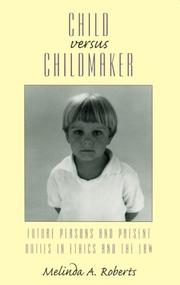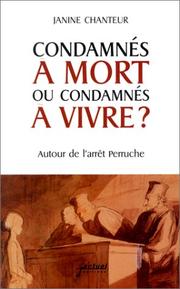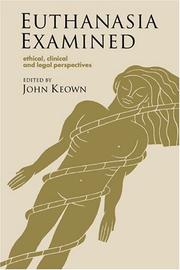| Listing 1 - 10 of 10 |
Sort by
|

ISBN: 2268041697 9782268041698 Year: 2002 Publisher: Monaco: Éditions du Rocher,
Abstract | Keywords | Export | Availability | Bookmark
 Loading...
Loading...Choose an application
- Reference Manager
- EndNote
- RefWorks (Direct export to RefWorks)

ISBN: 0847689018 084768900X Year: 1998 Publisher: Lanham Rowman & Littlefield
Abstract | Keywords | Export | Availability | Bookmark
 Loading...
Loading...Choose an application
- Reference Manager
- EndNote
- RefWorks (Direct export to RefWorks)
Child Versus Childmaker investigates a "person-affecting" approach to ethical choice. A form of consequentialism, this approach is intended to capture the idea that agents ought both do the most good that they can and respect each person as distinct from each other. Focusing on cases in which a conflict of interest arises between "childmakers"-parents, infertility specialists, embryologists, and others engaged in the task of bringing new people into existence-and the children they aim to create, the author considers what we today owe those who will come into existence tomorrow. Topics addressed include: what the person-affecting intuition is and how it differs from other forms of consequentialism; the consistency of the person-affecting intuition; the non-identity problem; wrongful life; and human cloning and other new reproductive technologies. This book is intended for upper-level undergraduates and graduate students in philosophy, law and economics and for anyone interested in bioethics, population policy, normative theory, children's rights, constitutional privacy, or family law.
Cloning --- Human reproductive technology --- Moral and ethical aspects. --- waarde van het leven (wrongful life) --- kloneren (klonen, therapeutisch kloneren, reproductief kloneren) --- voortplanting (reproductie) --- ethiek (ethische aspecten) --- valeur de la vie (vie préjudiciable, naissance préjudiciable) --- clonage (clonage thérapeutique, clonage reproductif) --- procréation (reproduction) --- ethique (aspects ethiques) --- Genetic engineering --- Reproduction, Asexual --- Moral and ethical aspects
Book
ISSN: 17685109 ISBN: 9782251430218 2251430210 Year: 2010 Publisher: Paris: Les Belles Lettres,
Abstract | Keywords | Export | Availability | Bookmark
 Loading...
Loading...Choose an application
- Reference Manager
- EndNote
- RefWorks (Direct export to RefWorks)
'Ce n'est plus une vie', 'je veux encore vivre, même avec cette maladie', 'ma vie n'a plus de valeur' : confronté à la maladie, à la déchéance physique, à la perte provisoire ou définitive de certaines capacités, chacun d'entre nous peut être conduit à énoncer de tels propos. Quoi de plus délicat, cependant, que l'évaluation de la valeur de la vie? Cet ouvrage aborde le sens et la portée de cette réflexion dans une situation où elle s'impose dans toute sa radicalité : celle des décisions de maintien ou d'interruption de la vie prises au chevet du patient dans les hôpitaux. En choisissant d'aborder ainsi la question de la valeur de la vie, ce livre fait le pari qu'une approche philosophique nourrie par une rencontre avec l'univers de la médecine contemporaine éclairera davantage le sens de cette notion, son fondement et ses limites, qu'une approche abstraite de tout contexte. La démarche cherche aussi à établir un dialogue entre philosophes et médecins en proposant une analyse des différents contextes thérapeutiques où une décision de maintien ou d'interruption de la vie doit être prise. A la lumière de cette analyse, l'ouvrage propose une réflexion critique sur les usages de l'idée de valeur de la vie pour en désavouer la pertinence et en nier la légitimité éthique. Les patients, malades mais aussi citoyens, doivent forger en concertation avec les médecins d'autres critères pour fonder une décision aussi déterminante que celle de maintenir ou d'interrompre le cours d'une vie humaine
Value of Life --- Philosophy, Medical --- Ethics, Medical --- Life --- Death --- Medical ethics --- Moral and ethical aspects --- waarde van het leven --- levenseinde (einde van het leven, levenseindebeslissing) --- levenskwaliteit --- stopzetting van behandeling --- ethiek (ethische aspecten) --- filosofie (filosofische aspecten) --- valeur de la vie --- fin de vie (décision de fin de vie) --- qualité de vie --- arrêt de traitement --- ethique (aspects ethiques) --- philosophie (aspects philosophiques) --- Biomedical ethics --- Clinical ethics --- Health care ethics --- Medical care --- Medicine --- Bioethics --- Professional ethics --- Nursing ethics --- Social medicine --- Philosophy --- Life - Moral and ethical aspects --- Death - Moral and ethical aspects
Book
ISBN: 9782845734043 2845734042 Year: 2006 Publisher: Paris : Parole et silence,
Abstract | Keywords | Export | Availability | Bookmark
 Loading...
Loading...Choose an application
- Reference Manager
- EndNote
- RefWorks (Direct export to RefWorks)
Ethics --- Science --- Bioethics --- Moral and ethical aspects --- Europa --- bio-ethiek (medische, biomedische ethiek, bio-ethische aspecten) --- wetenschappelijkheid --- humanisme --- waarde van het leven (wrongful life, arrest Perruche) --- persoon --- genetisch gemodificeerd organisme (GGO) --- Europe --- bioéthique (éthique médicale, biomédicale, aspects bioéthiques) --- scientificité (principe de scientificité) --- valeur de la vie (vie préjudiciable, naissance préjudiciable, arrêt Perruche) --- personne --- organisme génétiquement modifié (OGM) --- Conferences - Meetings --- Deontology --- Ethics, Primitive --- Ethology --- Moral philosophy --- Morality --- Morals --- Philosophy, Moral --- Science, Moral --- Philosophy --- Values --- Ethics and science. --- Morale --- Sciences et morale --- Éthique --- Bioéthique --- 1990 --- -20e siècle --- 20e siècle
Multi
ISBN: 9789089741776 Year: 2009 Publisher: Place of publication unknown Boom Juridische Uitgevers
Abstract | Keywords | Export | Availability | Bookmark
 Loading...
Loading...Choose an application
- Reference Manager
- EndNote
- RefWorks (Direct export to RefWorks)
Status of persons --- Biotechnology --- Professional ethics. Deontology --- Medical law --- medisch recht (biomedisch recht) --- rechtsvergelijking --- bio-ethiek (medische, biomedische ethiek, bio-ethische aspecten) --- persoon --- lichaam --- menswaardigheid (waardigheid) --- biomedische technologie --- mensbeeld --- embryostatuut (moreel statuut van het embryo, juridisch statuut van het embryo, potentiële persoon) --- waarde van het leven (wrongful life, arrest Perruche) --- Nederland --- Frankrijk --- droit médical (droit biomédical) --- droit comparé --- bioéthique (éthique médicale, biomédicale, aspects bioéthiques) --- personne --- corps --- dignité humaine --- technologie biomédicale --- image de l'homme --- statut de l'embryon (statut moral de l'embryon, statut juridique de l'embryon, personne potentielle) --- valeur de la vie (vie préjudiciable, naissance préjudiciable, arrêt Perruche) --- Pays-Bas --- France --- Theses --- Bioethics --- Dignity --- Genetic engineering --- Human experimentation in medicine --- Medical ethics --- Respect for persons --- Human rights --- Biomedical ethics --- Clinical ethics --- Ethics, Medical --- Health care ethics --- Medical care --- Medicine --- Professional ethics --- Nursing ethics --- Social medicine --- Medical laws and legislation --- Human dignity --- Values --- Biology --- Life sciences --- Life sciences ethics --- Science --- Law and legislation --- Moral and ethical aspects

ISBN: 2940313083 9782940313082 Year: 2002 Publisher: Genève: Factuel,
Abstract | Keywords | Export | Availability | Bookmark
 Loading...
Loading...Choose an application
- Reference Manager
- EndNote
- RefWorks (Direct export to RefWorks)
Fetus --- Personality (Law) --- Civil rights --- Physicians --- Children with disabilities --- Abortion --- Legal statuts, laws, etc. --- Malpractice --- Legal status, laws, etc. --- Law and legislation --- 17.023.33 --- handicap --- ethiek (ethische aspecten) --- waarde van het leven (wrongful life, arrest Perruche) --- Frankrijk --- Biologische doeleinden. Bio-ethiek; bioethiek. Übermensch. Medische deontologie --- invalidité (handicap) --- ethique (aspects ethiques) --- valeur de la vie (vie préjudiciable, naissance préjudiciable, arrêt Perruche) --- France --- 17.023.33 Biologische doeleinden. Bio-ethiek; bioethiek. Übermensch. Medische deontologie --- Abortion, Induced --- Feticide --- Foeticide --- Induced abortion --- Pregnancy termination --- Termination of pregnancy --- Birth control --- Fetal death --- Obstetrics --- Reproductive rights --- Foetus --- Unborn child --- Embryology --- Reproduction --- Children with special educational needs --- Children with special health care needs --- Children with special needs --- Handicapped children --- Physically handicapped children --- Special needs children --- Exceptional children --- People with disabilities --- Legal status, laws, etc --- Legal statuts, laws, etc --- Surgery --- Perruche, Nicolas --- Fetus - Legal statuts, laws, etc. - France. --- Personality (Law) - France. --- Civil rights - France. --- Physicians - Malpractice - France. --- Children with disabilities - Legal status, laws, etc. - France. --- Abortion - Law and legislation - France.

ISBN: 2070764206 9782070764204 Year: 2002 Publisher: Paris: Gallimard,
Abstract | Keywords | Export | Availability | Bookmark
 Loading...
Loading...Choose an application
- Reference Manager
- EndNote
- RefWorks (Direct export to RefWorks)
Abortion --- Children with disabilities --- Fetus --- Personality (Law) --- Physicians --- Wrongful life --- Frankrijk --- waarde van het leven (wrongful life, arrest Perruche) --- 17.023.33 --- 13.01.F --- 17.023.33 Biologische doeleinden. Bio-ethiek; bioethiek. Übermensch. Medische deontologie --- Biologische doeleinden. Bio-ethiek; bioethiek. Übermensch. Medische deontologie --- Children with special educational needs --- Children with special health care needs --- Children with special needs --- Handicapped children --- Physically handicapped children --- Special needs children --- Exceptional children --- People with disabilities --- Abortion, Induced --- Feticide --- Foeticide --- Induced abortion --- Pregnancy termination --- Termination of pregnancy --- Birth control --- Fetal death --- Obstetrics --- Reproductive rights --- Birth, Wrongful --- Liability for prenatal diagnosis --- Liability for unwanted pregnancy --- Prenatal diagnosis, Liability for --- Unwanted pregnancy, Liability for --- Wrongful birth --- Wrongful conception --- Wrongful pregnancy --- Medical personnel --- Foetus --- Unborn child --- Embryology --- Reproduction --- Law and legislation --- Legal status, laws, etc --- Malpractice --- France --- valeur de la vie (vie préjudiciable, naissance préjudiciable, arrêt Perruche) --- Wettelijke en contractuele aansprakelijkheid ; Algemeen ; Frankrijk --- Surgery --- Perruche, Nicolas --- Trials, litigation, etc. --- Legal status, laws, etc. --- Personnes (droit) --- Réparation (droit) --- Personnel médical --- Avortement --- Bioéthique. --- Responsabilité légale. --- Handicapés --- Responsabilité professionnelle. --- Droit. --- Statut juridique. --- Bioethics --- Bioéthique --- Grossesse préjudice --- Fœtus --- Droit de la personnalité --- Médecins --- Enfants handicapés --- Droit --- Responsabilité professionnelle --- Wrongful birth - France. --- Fetus - Law and legislation - France. --- Personality (Law) - France. --- Physicians - Malpractice - France. --- Children with disabilities - Legal status, laws, etc. - France. --- Abortion - Law and legislation - France.
Book
ISBN: 940072604X 1402056966 9786612826979 1282826972 1402056974 9781402056963 Year: 2009 Publisher: Dordrecht: Springer,
Abstract | Keywords | Export | Availability | Bookmark
 Loading...
Loading...Choose an application
- Reference Manager
- EndNote
- RefWorks (Direct export to RefWorks)
This collection of essays investigates the obligations we have in respect of future persons, from our own future offspring to distant future generations. Can we harm them? Can we wrong them? Can the fact that our choice brings a worse off person into existence in place of a better off but "nonidentical" person make that choice wrong? We intuitively think we are obligated to treat future persons in accordance with certain stringent standards—roughly those we think apply to our treatment of existing persons. We think we ought to create better lives for at least some future persons when we can do so without making things worse for too many existing or other future persons. We think it would be wrong to engage in risky behaviors today that will have clearly adverse effects for the children we intend one day to conceive. And we think it would be wrong to act today in a way that would turn the Earth of the future into a miserable place. Each of these intuitive points is, however, challenged by the nonidentity problem. That problem arises from the observation that future persons often owe their very existence to choices that appear to make things worse for those same persons. New reproductive technologies, for example, can be both risky and essential to one person’s coming into existence in place of a "nonidentical" other or no one at all. But so can a myriad of other choices, whether made just prior to conception or centuries before—choices that seem to have nothing to do with procreation but in fact help to determine the timing and manner of conception of any particular future person and thus the identity of that person. Where the person’s life is worth living, it is difficult to see how he or she has been harmed, or made worse off, or wronged, by such an identity-determining choice. We then face the full power of the nonidentity problem: if the choice is not bad for the future person it seems most adversely to affect, then on what basis do we say that choice is wrong? The nonidentity problem has implications for moral theory, population policy, procreative choice, children’s rights, bioethics, environmental ethics, the law and reparations for historical injustices. The contributors to this collection offer new understandings of the nonidentity problem and evaluate an array of proposed solutions to it. Aimed at philosophers, legal scholars, bioethicists and students in all these disciplines, this collection is a thorough exploration of one of the most fascinating and important moral issues of our time.
Ethics. --- Ethics --- Morals --- Psychology, Social --- Behavior and Behavior Mechanisms --- Psychiatry and Psychology --- Philosophy --- Philosophy & Religion --- Life and death, Power over. --- Death, Power over --- Power over life and death --- Deontology --- Ethics, Primitive --- Ethology --- Moral philosophy --- Morality --- Philosophy, Moral --- Science, Moral --- Philosophy. --- Human genetics. --- Law --- Law. --- Medical laws and legislation. --- Constitutional law. --- Sociology. --- Sociology, general. --- Human Genetics. --- Constitutional Law. --- Medical Law. --- Theories of Law, Philosophy of Law, Legal History. --- Values --- Free will and determinism --- Liberty --- Punishment --- Public health laws. --- Constitutional law --- Constitutional limitations --- Constitutionalism --- Constitutions --- Limitations, Constitutional --- Public law --- Administrative law --- Genetics --- Heredity, Human --- Human biology --- Physical anthropology --- Communicable diseases --- Public health --- Medical laws and legislation --- Interpretation and construction --- Law and legislation --- Law—Philosophy. --- Acts, Legislative --- Enactments, Legislative --- Laws (Statutes) --- Legislative acts --- Legislative enactments --- Jurisprudence --- Legislation --- Law, Medical --- Medical personnel --- Medical registration and examination --- Medicine --- Physicians --- Surgeons --- Medical policy --- Medical jurisprudence --- Social theory --- Social sciences --- Legal status, laws, etc. --- waarde van het leven (wrongful life, arrest Perruche) --- valeur de la vie (vie préjudiciable, naissance préjudiciable, arrêt Perruche)

ISBN: 140201029X 9048161789 9401719764 Year: 2002 Publisher: Dordrecht Kluwer Academic Publishers
Abstract | Keywords | Export | Availability | Bookmark
 Loading...
Loading...Choose an application
- Reference Manager
- EndNote
- RefWorks (Direct export to RefWorks)
This is an original contribution to the much debated area of the value that we should place on human life. With the euthanasia issue highlighted in the public arena this book argues for a non-absolutist highest value on life ethic and how that fits with society's current emphasis on individual autonomy. By the use of everyday examples the impact of placing a high value on life is explored. It will be useful for students of ethics, nursing and medicine and those engaged in the public debate on euthanasia. With the euthanasia issue highlighted in the public arena, this book argues for a non-absolutist highest value on life ethic and how that fits with society's current emphasis on individual autonomy. It is suitable for students of ethics, nursing and medicine and those engaged in the public debate on euthanasia.
#GBIB:CBMER --- Death --- Death. --- Euthanasia. --- Life and death, Power over. --- Medical ethics. --- Terminal care --- Time of. --- Moral and ethical aspects. --- dood --- hersendood --- autonomie --- euthanasie (hulp bij zelfdoding) --- ethiek (ethische aspecten) --- mort --- mort cérébrale --- euthanasie (suicide assistée) --- ethique (aspects ethiques) --- Euthanasia --- Life and death, Power over --- Medical ethics --- hellend vlak --- waarde van het leven --- Biomedical ethics --- Clinical ethics --- Ethics, Medical --- Health care ethics --- Medical care --- Medicine --- Bioethics --- Professional ethics --- Nursing ethics --- Social medicine --- Death, Power over --- Power over life and death --- Ethics --- Free will and determinism --- Liberty --- Punishment --- Assisted death (Euthanasia) --- Assisted dying (Euthanasia) --- Death, Assisted (Euthanasia) --- Death, Mercy --- Dying, Assisted (Euthanasia) --- Killing, Mercy --- Mercy death --- Mercy killing --- Homicide --- Assisted suicide --- Right to die --- Time of death --- Dying --- End of life --- Life --- Terminally ill --- Thanatology --- Time of --- Moral and ethical aspects --- pente glissante (risque de dérives) --- valeur de la vie --- Proof and certification --- Philosophy --- Professional ethics. Deontology --- Sociology of health --- Medical law --- Ethics. --- Medicine—Philosophy. --- Theory of Medicine/Bioethics. --- Philosophy of Medicine. --- Deontology --- Ethics, Primitive --- Ethology --- Moral philosophy --- Morality --- Morals --- Philosophy, Moral --- Science, Moral --- Values

ISBN: 0521586135 0521451418 0511663447 0511884117 9780521451413 9780511663444 9780521586139 Year: 1999 Publisher: Cambridge : Cambridge university press,
Abstract | Keywords | Export | Availability | Bookmark
 Loading...
Loading...Choose an application
- Reference Manager
- EndNote
- RefWorks (Direct export to RefWorks)
Whether euthanasia or assisted suicide should be legalised is one of the most pressing and profound questions facing legislators, health-care professionals, their patients and indeed all members of society. Regrettably, the debate is too often characterised by rhetoric rather than reason. This book aims to inform the debate by acquainting anyone interested in this vital question with some of the major ethical, legal and clinical and theological issues involved. The essays it contains are authoritative, balanced and readable: authoritative in that they have been commissioned from some of the world's leading experts; balanced in that they reflect divergent viewpoints (including a vigorous debate between two eminent philosophers); and readable in that they should be readily intelligible to the general reader. This accessible, fair and learned collection should enlighten all who wish to be better informed about the debate surrounding this momentous issue.
Euthanasia --- Ethics, Medical --- Euthanasia, Passive --- Suicide, Assisted --- -euthanasie (hulp bij zelfdoding) --- waarde van het leven --- filosofie (filosofische aspecten) --- vegetatieve staat (persistente vegetatieve staat) --- Nederland --- ethiek (ethische aspecten) --- theologie (theologische aspecten) --- Euthanasia, Involuntary --- Involuntary Euthanasia --- Mercy Killing --- Killing, Mercy --- Killings, Mercy --- Mercy Killings --- Euthanasia, Negative --- Negative Euthanasia --- Passive Euthanasia --- Allowing to Die --- Medical Ethics --- Medicine --- Assisted death (Euthanasia) --- Assisted dying (Euthanasia) --- Death, Assisted (Euthanasia) --- Death, Mercy --- Dying, Assisted (Euthanasia) --- Mercy death --- Mercy killing --- Medically Assisted Suicides --- Suicide, Medically Assisted --- Suicides, Medically Assisted --- Assisted Suicide --- Death, Assisted --- Medically Assisted Suicide --- Physician-Assisted Suicide --- Assisted Death --- Assisted Deaths --- Assisted Suicides --- Deaths, Assisted --- Physician Assisted Suicide --- Physician-Assisted Suicides --- Suicide, Physician-Assisted --- Suicides, Assisted --- Suicides, Physician-Assisted --- Moral and ethical aspects --- Law and legislation --- euthanasie (suicide assistée) --- valeur de la vie --- philosophie (aspects philosophiques) --- état végétatif (état végétatif persistant, état neurovégétatif persistant) --- Pays-Bas --- ethique (aspects ethiques) --- théologie (aspects théologiques) --- ethics --- Euthanasie --- Moral and ethical aspects. --- Aspect moral --- 603.1 --- ethiek --- euthanasie --- medische ethiek --- recht --- Medische ethiek --- euthanasie (hulp bij zelfdoding) --- Right to Die --- Euthanasia, Active --- Euthanasia, Active, Voluntary --- Resuscitation Orders --- Bioethical Issues --- Professionalism --- Bioethics --- -179.7 --- 614.253.8 --- 343.61 --- Homicide --- Medical ethics --- Assisted suicide --- Right to die --- Natural law --- Criminal law. Criminal procedure --- Professional ethics. Deontology --- Human medicine --- Health Sciences --- General and Others --- Euthanasia - Moral and ethical aspects --- -Moral and ethical aspects
| Listing 1 - 10 of 10 |
Sort by
|

 Search
Search Feedback
Feedback About UniCat
About UniCat  Help
Help News
News